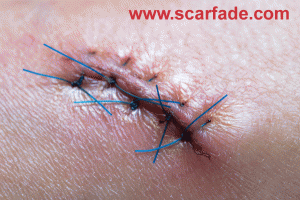After a skin injury, it takes time for scars to heal. Exactly how long depends on a number of factors, including the size and depth of the scar, your genes, your skin type and whether there’s an infection, to name a few. There are a host of other things that affect how quickly your scar fades – things that you can control. Here are 6 things that slow down scar healing.

1. Smoking
A rich blood supply to the area helps it to heal faster. Smoking tobacco inhibits your body’s blood flow, slowing down the healing process.
2. Illness
When you’re sick, your body is fighting off infection. Depending on your illness, your body will likely spend less energy on regenerating new skin cells than combatting infection through your immune system. For issues such as diabetes, Lyme disease and cancer, patients can expect wounds and scars to heal more slowly. Aside from chronic illness, thoroughly washing your hands more frequently limits the likelihood of spreading bacteria and getting sick with a cold or the flu.
3. Picking Scabs
Part of the skin’s healing process is to form a scab over an open wound. This protects the body from foreign bodies and is an important step in forming new skin. While scabs can itch, it’s important to leave them in place. Every time you pull off the scab, it sets back the healing process and exposes the area beneath to possible infection. The scab will eventually go away as a scar forms.
4. Excessive Submersion In Water
While moisture helps the skin to heal faster, submersion for long periods of time can slow the healing of scars. After a long soak in the bathtub or a nice hot shower, you may have noticed that your scabs or scars are soft and discolored. Long periods underwater or exposure to running water can make the scabs or softened new skin fall off. This prolongs the healing process. Immersion in cold water for more than a minute or two slows down blood flow, which in turn slows down scar healing.
5. Lack of Sleep
Numerous medical studies show that the body does its best healing when its asleep. Your skin rejuvenates more quickly because your body sends out healing hormones. If you don’t get enough restful sleep, your body can’t regenerate as efficiently and your scars heal more slowly.
6. Vitamin Deficiency
Vitamin C, Vitamin D and zinc help your body heal in different ways. When you don’t get enough of the recommended daily allowance of these important vitamins and minerals, it can take longer for your scars to heal. Eating foods rich in vitamins and minerals gives your body fuel for faster and more effective healing. Zinc, for example, helps boost your body’s immune system and accelerates skin cell renewal. Look for zinc in spinach, wheat germ, lamb and lean beef. Vitamin C is an antioxidant. Boost healing by eating high C foods such as broccoli, tomatoes, cabbage and oranges. Foods rich in Vitamin D improve your immune system and help stave off infections. Strong sources of Vitamin D include whole milk, wild-caught sockeye salmon and Shiitake mushrooms.
